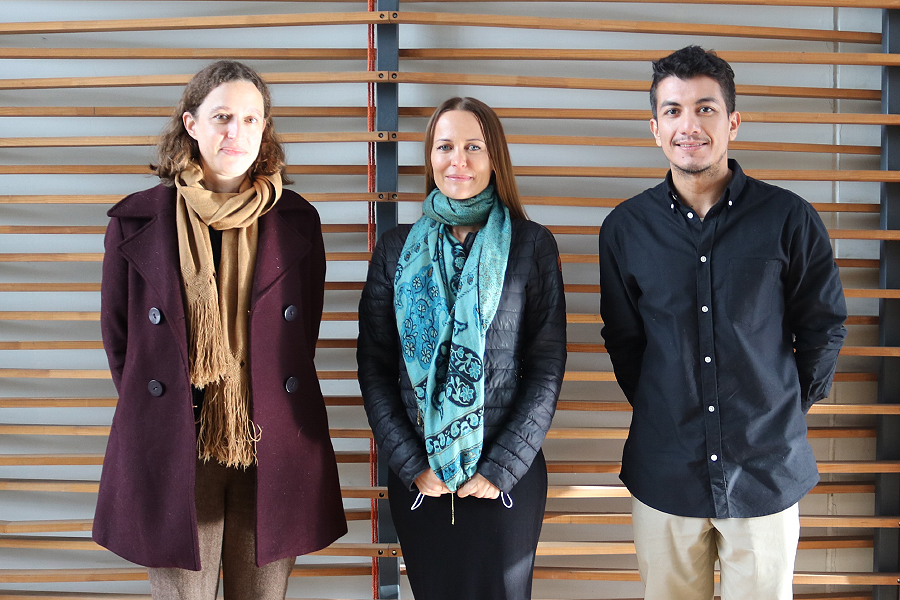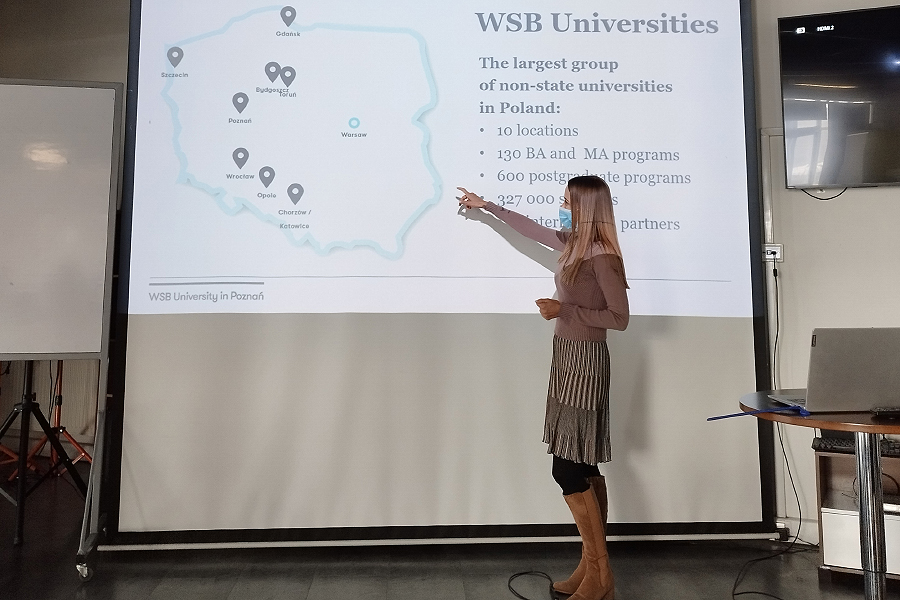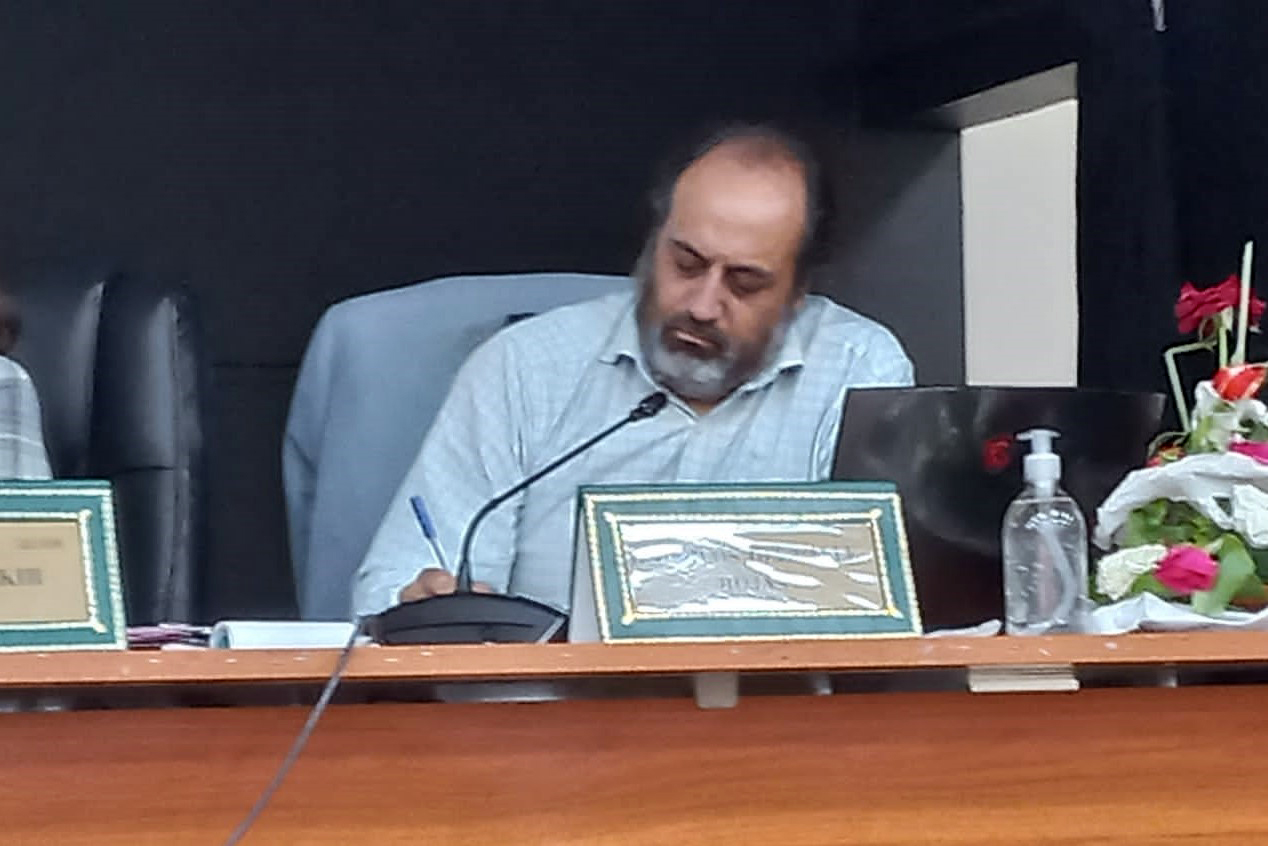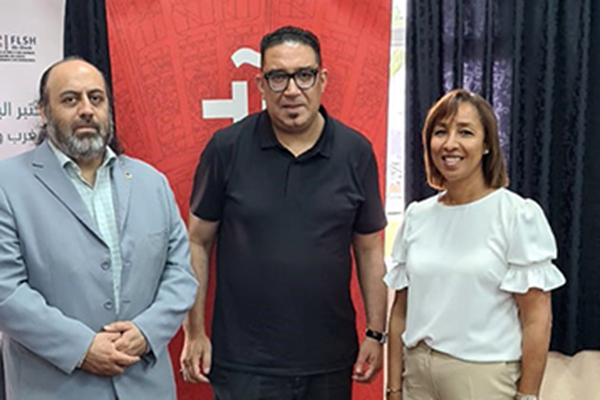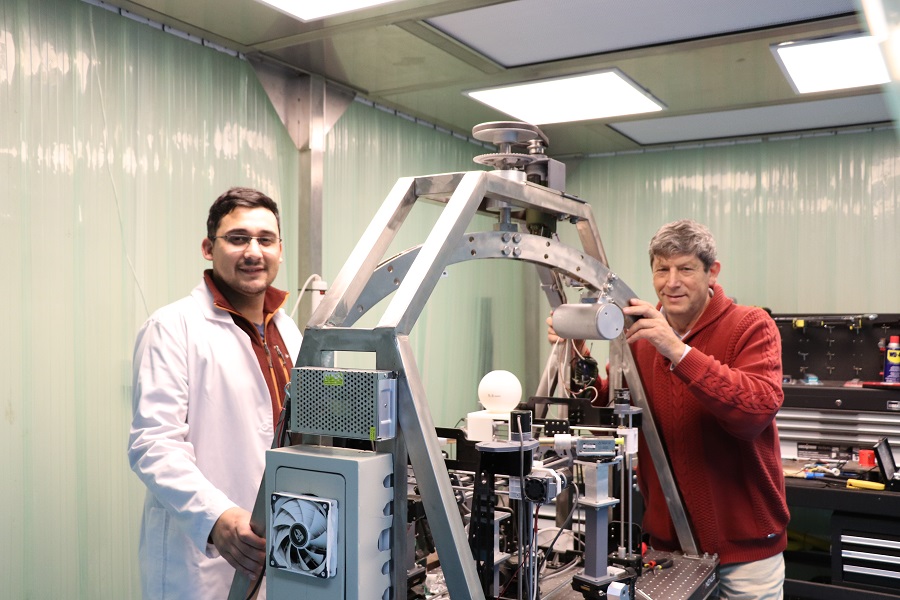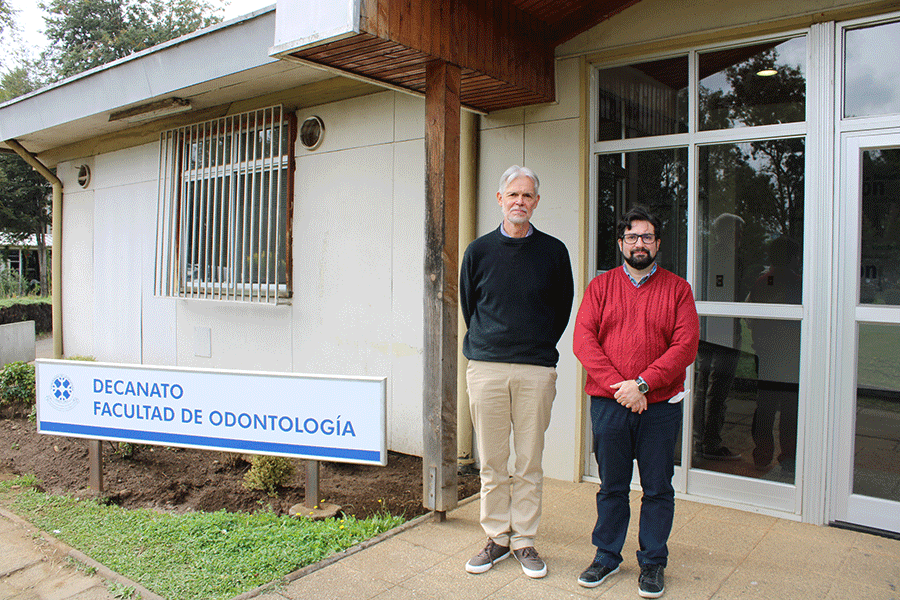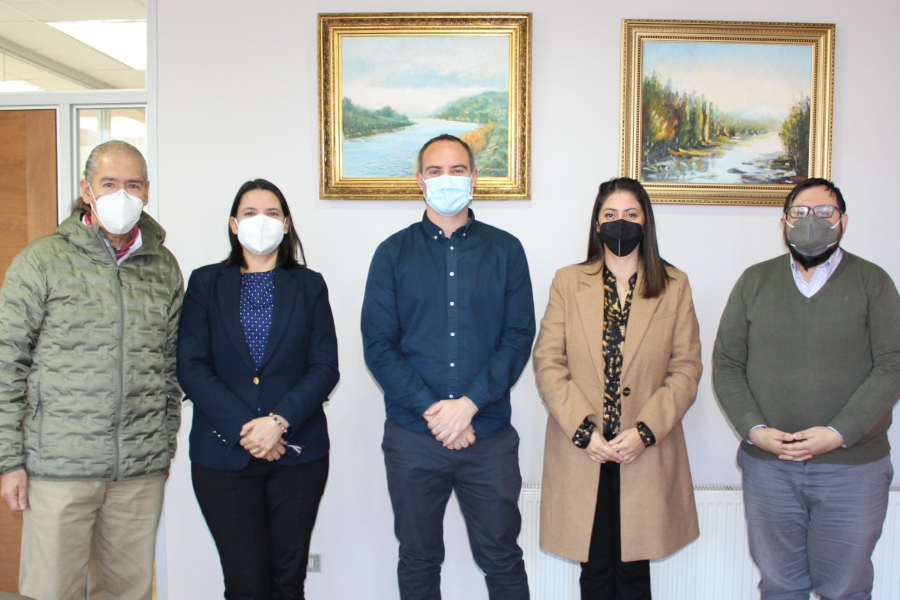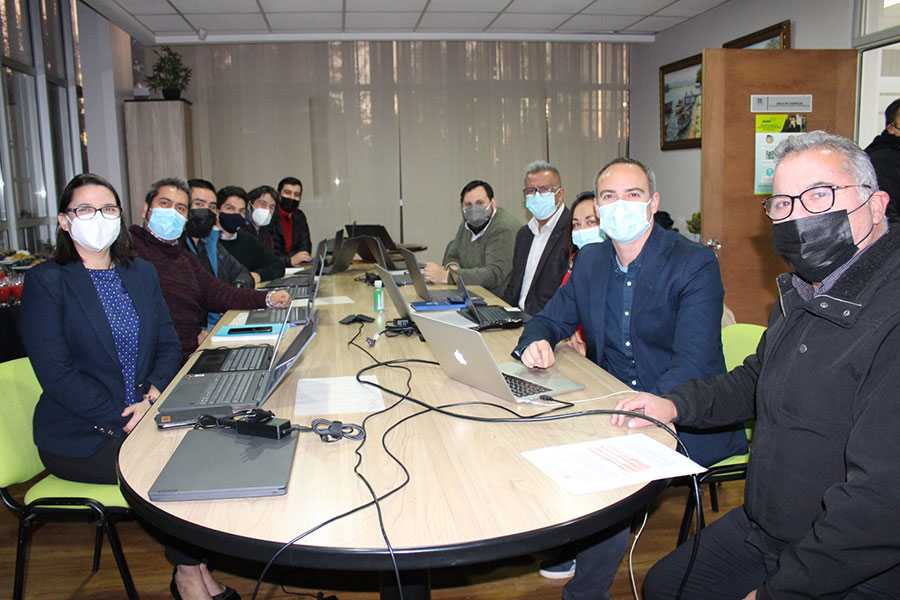|
During her visit, Dr. Edyta Wojtyla gave a presentation about her university for the academics and researchers of UFRO, highlighting important areas of development. The history of WSB University in Poznan began in 1994 and this year, it celebrates its 28th anniversary. |
The vice-dean of the Faculty of Finance and Banking of WSB University in Poznan (Poland), Dr. Edyta Wojtyla, visited the Universidad de La Frontera (UFRO) in Chile in order to get to know the university and to establish valuable links of cooperation. Therefore, she carried out a series of activities, focusing on two areas: research and academic work. During her visit, the representative of the Polish university met with Dr. Eduardo Hebel, the rector of UFRO, Dr. Lorena Vieli, the director of the International Affairs Office, and César Miranda, who is in charge of the Erasmus+ Programs. In addition, she carried out different activities for UFRO academics and researchers, presenting her university and the opportunities it offers as a partner university for Erasmus+ projects. In this regard, Dr. Lorena Vieli, the director of the International Affairs Office, explained: “The Universidad de La Frontera got invited to this Erasmus+ project and Dr. Edyta Wojtyla is our first visitor out of several ones. Originally, we planned these activities for 2020, but they could not take place because of the pandemic. But now we are resuming our activities and we invite our academics to visit WSB University in Poznan and to get to know our common fields and interests”. WSB UNIVERSITY IN POZNAN During her visit, Dr. Edyta Wojtyla gave a presentation about her university for the academics and researchers of UFRO, highlighting important areas of development. The history of WSB University in Poznan began in 1994 and this year, it celebrates its 28th anniversary. Today, it is known as one of the leading private universities in Poland, with distinctions, accreditations and national and international certificates that reinforce its prestige. “It is worth mentioning that Erasmus+ projects do not only concentrate on the visits, but also help you to strengthen your academic skills, your personal development and to work on your intercultural competencies. They help you to acquire the skills you need to be successful in the current context of globalization,” explains César Miranda, inviting the UFRO community to participate in these opportunities of internationalization. Written by: UFRO Communications Office |
|
The international cooperation agreements with Moroccan universities will benefit joint research and postgraduate activities. |
After the invitation of the Moroccan embassy in Chile, Dr. Carlos del Valle of the Universidad de La Frontera (UFRO) visited the country and participated in a variety of activities that allowed making progress regarding international cooperation with the Doctoral Program in Communications of UFRO, especially regarding research and postgraduate studies. The relations between the Doctoral Program of UFRO, which is led by Dr. Carlos del Valle together with the Chilean university Universidad Austral de Chile, and the Moroccan embassy date back to 2018, when they carried out several activities together. In this context, the objective of this visit was to open new spaces for bilateral cooperation. The visit included three cities, visiting the universities UFRO cooperates with: Sidi Mohamed Ben Abdellah University in Fez, Mohammed V University in Rabat, and Hassan II University of Casablanca. Apart from different meetings, Dr. del Valle held a conference in the second International Congress of the Moroccan Association for Iberian and Latin-American Studies: ‘Morocco and Latin-America: Common and imaginary heritage and crossed experiences’. In addition, he had the chance to get to know the University of al-Qarawiyyin, which was founded by Fátima al-Fihri in the year 859 and is known as the oldest university in the world. COOPERATION AGREEMENTS The Moroccan embassy and the Center for Culture in Chile facilitate the relations established between the Doctoral Program and the Moroccan universities. Currently, UFRO has a cooperation agreement with the Abdelmalek Essaâdi University in Tetouan, and another agreement draft with the Hassan II University of Casablanca, which they started to work on after the visit of Dr. del Valle. The ambassador of Morocco to Chile, Kenza El Ghali, pointed out that the links with UFRO facilitate cultural exchange and open spaces for new ideas of cooperation, as for example the establishment of a Moroccan Chair or the exchange of doctoral students. “In order to strengthen this relationship and to work on the Chair, we elaborated an agreement between our Center for Culture and the university,” the diplomat commented, indicating that there are several issues of common interest. She added that one of the aims is to generate student mobility opportunities on both sides, in order to share each country’s knowledge and experiences. According to Dr. del Valle, the agreements with these universities focus on joint research, publications and future cotutelle and double degree agreements, especially in the fields of communications and culture, as well as communication in inter- and multicultural contexts. “We have a lot in common and we want to make progress regarding compared studies, especially in inter- and multicultural contexts, for example considering policies with the Berbers or Imazighen, besides the differences between both groups,” he indicated. Regarding the activities carried out during his visit, Dr. del Valle commented: “We made progress with the two universities and during our visit we were able to get in direct contact with the researchers and to start a new partnership with one more university”. He also pointed out that in the second semester this year, one of the students of the doctoral program in communications will go to the Abdelmalek Essaâdi University in Tetouan in Morocco, in order to work on his research and different publications. MOROCCAN CHAIR Dr. del Valle explained that they are working on a specific agreement to establish a Moroccan Chair for the doctoral program that will allow to hold conferences and seminars with Moroccan academics, as well as to work on joint research and publications, especially in the field of inter- and multicultural communication. “At our university, we need a wider perspective of interculturality, which is already theoretically and politically exhausted and requires new explanatory models,” he explained. Written by: UFRO Communications Office |
|
This new Center is part of the Faculty of Engineering and Science of the Universidad de La Frontera. It will allow contributing to society, research and the development of new technological tools that will have an impact on people’s health. |
The Universidad de La Frontera (UFRO) has a new Center of Excellence since 2022 that combines the experience and complexity of different fields of knowledge. The Center of Excellence in Medical Physics and Engineering (CFIS) is a new academic unit and part of the Faculty of Engineering and Science. It is an important space with a synergy between physics, engineering sciences and other experts and researchers in the field of health, to develop high-level research that leads to innovative solutions with a positive impact on the fields of medicine and health in general. At the same time, this collaborative work will contribute to the training of advanced human capital and lead to new national and international cooperation networks. Dr. Rodolfo Figueroa Saavedra, an academic of the Department of Physical Sciences at UFRO and the manager of this new center, explained: “The Center of Excellence in Medical Physics and Engineering is the continuation of our research, which is in constant progress and which we started within the Center for Medical Physics and Engineering (CFIM). Part of this work was to develop medical applications, but as time went by, we realized that these applications also include other disciplines such as dentistry, public health, veterinary medicine, and so on. We felt that it was necessary to expand our network in order to cover the countless disciplines in the field of health.” Apart from the intention of positioning themselves as national and international references, the scientists and researchers who will be part of this center will carry out applied research, mostly in cancer treatment, through the study and development of new methods of medical imaging, radiation therapy and theranostics, as well as in other fields of health, in which physics and engineering can lead to an improvement of people’s health. Another part of their work will be the development of different medical, dental and health devices in general, as well as applications of radiation therapy in animals and different services, such as radiological protection courses for UFRO employees, equipment calibrations, etc. For this convergence of disciplines, experts of different faculties of the Universidad de La Frontera will be working together in this center, for example of the Faculty of Engineering and Science, the Faculty of Medicine, the Faculty of Dentistry, and the Faculty of Agricultural and Forestry Science. This cross-cutting approach will strengthen one of the center's primary objectives, which is oriented towards the development of innovations for the benefit of the people and the development of the respective invention patent applications and the technological transfers that they entail. “Part of our work as a faculty focuses on developing and promoting research of excellence, which has a positive impact on society. In this case, we are talking about the field of health, a very sensitive area that demands multidisciplinary efforts to respond to the different needs,” explained Dr. Jorge Farías Avendaño, the dean of the Faculty of Engineering and Science. Another long-awaited project, which is expected to take shape through the implementation of the Center of Excellence in Medical Physics and Engineering, is the creation of a doctoral program in the field of medical physics and engineering. That program would consolidate the line of research that Dr. Rodolfo Figueroa initiated 14 years ago with the creation of the Master’s Degree Program in Medical Physics and Engineering, which various researchers of different units of the Universidad de La Frontera support.
Written by: Daphne Bormann |
|
The book focuses exclusively on the field of dentistry, with examples in each chapter, what makes its practical orientation even more useful for the ones who want to enter the world of economic evaluation. |
The editors of the book ‘Introduction to Economic Evaluation in Oral Health Care’, which was published by the prestigious publisher Springer Nature, are the researchers Dr. Carlos Zaror of the Department of Pediatric Dentistry and Orthodontics, Faculty of Dentistry, Universidad de La Frontera (UFRO) in Chile, and Dr. Rodrigo Mariño of the Melbourne Dental School, University of Melbourne in Australia. According to Dr. Zaror, economic evaluation in the field of health allows comparing different therapeutic alternatives in terms of their costs and effectiveness. Therefore, it is very useful in the decision-making regarding the implementation of certain interventions. Given its importance and the need to address this issue, especially in oral health, both researchers, driven by their experience and knowledge in economic evaluation, decided to publish this book, which has 13 chapters. “The idea for this book started with the work we carried out together with Dr. Carlos Zaror over time. We realized that economic evaluation in the field of health increased over the years, but the field of dentistry was falling behind compared with other medical disciplines. That is why we started to work on this book, not for training specialists in economic evaluation, but for the professionals to understand the process. It contains basic aspects with practical examples, so that people with no previous training in health economics can understand them,” explained Dr. Mariño. For the publication of this book, both editors invited international experts from Australia, Chile, the United States, England and Sweden to collaborate and write some of the chapters. “The practice-oriented nature of this book is very useful for those who are new in the field of economic evaluation, but it is also important for decision-makers in healthcare, when they need guidance on how to interpret the evidence available on economic evaluation. To this end, the last three chapters of the book focus on how to use the existing evidence to make decisions, whether clinical or from the point of view of public health in general,” Dr. Carlos Zaror pointed out. Besides the international positioning of the editors in the field of economic evaluation in oral health care, this publication also allows them to build a cooperation network with the experts, researchers and institutions that participated in this publication. The book is available in Springer Nature, under the following link:
|
|
Dr. Alonso Dos Santos received the Applied Marketing Research Competition Award 2020 at the Carolan Research Forum and the Amorós Award from the Foundation for Research in Physical Activity and Sport Sciences in 2019 and 2020 in Chile. He is an associate professor of the Chilean university Universidad Católica de la Santísima Concepción, coordinator of the Marketing Department, professor of marketing and market research in business engineering. |
The Outreach and Community Engagement unit of the Faculty of Law and Business (FCJE) of the Universidad de La Frontera (UFRO) received Dr. Alonso Dos Santos, an associate professor from the Faculty of Economics and Business of the University of Granada in Spain. The academic, who holds a Ph.D. in Marketing and Consumer Behavior and a Master's Degree in Marketing and Consumer Behavior, visited the faculty as part of the mobility program for academic purposes of his university. Within his visit at FCJE-UFRO, Dr. Alonso Dos Santos carried out the hybrid workshop “Market Research”, which was aimed at students of the Master’s degree program in Business Administration (MBA) and academics of the Department of Management and Economics. The workshop reviewed the basic operation of SPSS software for statistical analysis in social sciences, which provides significant tools and techniques for data analysis in market research. In addition, he gave a talk about “The Research behind Neuromarketing”, in which he presented the four main techniques of Neuromarketing, its characteristics and some applications in research. “The idea behind the meeting was to stimulate the development of research ideas in marketing and market research, to strengthen the participants’ research skills in that field, and to provide tools and encourage collaborations. One example is the application of eye tracking to detect how consumers look at certain parts of advertisements,” he explained. The purpose of the activities developed by Dr. Alonso Dos Santos was to strengthen the internationalization of the academic staff and undergraduate and graduate students of FCJE-UFRO, to enhance their skills and knowledge in the field of business, as well as to promote joint research between the Faculty of Law and Business in Chile and the University of Granada in Spain. The director of the Outreach and Community Engagement unit of FCJE-UFRO, Dr. Carolina González Suhr, highlighted the workshops carried out by Dr. Alonso Dos Santos and the opportunities to create strategic partnerships with the Faculty of Economics and Business in Spain. “The visit of Dr. Alonso Dos Santos was very inspiring and important for our faculty. It allowed us to learn about the latest developments in the field, with practical examples and advice for both the development of research ideas and the development of our undergraduate and graduate programs. In addition, we can start partnerships and possible cooperation agreements with the University of Granada this way,” she pointed out. Within his activities at UFRO, Dr. Alonso Dos Santos also had a meeting with Dr. Lorena Vieli del Río, the director of the International Affairs Office. “We talked about how to revitalize the existing agreement between the two universities and about exchange opportunities, not only at the faculty level, but also at the university level, starting with the exchange of students, staff and academics, for research, but also for the exchange of classroom experiences,” she commented. Written by: Faculty of Law and Business, UFRO |





